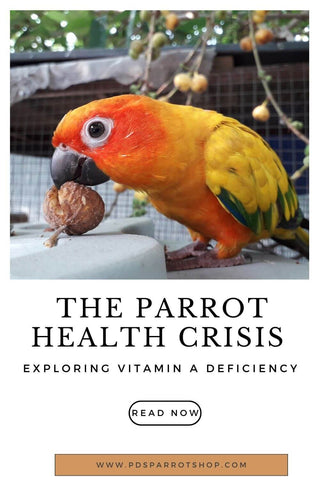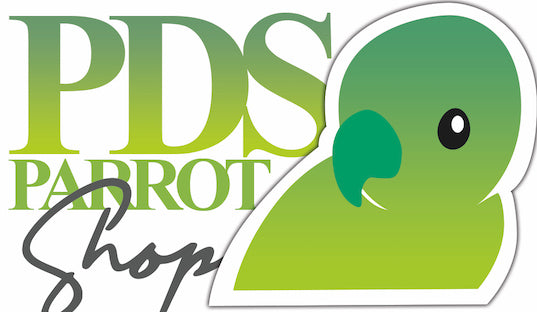
The Parrot Health Crisis: Exploring Vitamin A Deficiency
Share
Vitamin A deficiency, also known as hypovitaminosis A, stands as a prevalent yet often overlooked issue among parrot companions. Remarkably, this concern is not only preventable but also readily treatable. To fully grasp the gravity of this matter, let us delve into the significance of Vitamin A and the far-reaching consequences of its absence.

Pin Me!
Decoding Vitamin A's Multifaceted Importance
Vitamin A, a fat-soluble gem, holds sway over a multitude of physiological functions. Not only does it facilitate tissue growth and repair, but it also functions as a formidable antioxidant. The orchestration of vital elements like eyesight, skin health, auditory acuity, bone strength, and membrane integrity all owes a debt to the presence of Vitamin A.
Unraveling the Web of Consequences from Deficiency in parrots
The deficiency of Vitamin A in parrots creates a cascade of tissue damage, particularly within the respiratory, digestive, and reproductive systems. The cellular changes provoked by this dearth hinder the secretion of protective mucous barriers. Consequently, the doors are flung open for opportunistic bacterial infections, compromising the avian organism's resilience

The Nexus Between Vitamin A and Infections
Vitamin A's pivotal role in sustaining the integrity of mucous layers cannot be overstated in parrots. It is this layer that stands sentinel against the intrusion of pathogens. When Vitamin A is in short supply, this fortification crumbles, leaving the parrot vulnerable to bacterial, fungal, and viral onslaughts. The vicious cycle of recurring infections is thus set into motion.
The Culprit: Monotonous Diets and Vitamin A Deficiency
The preeminent cause of Vitamin A deficiency in parrots lies squarely on their dietary regimen. A diet predominantly consisting of seeds, devoid of the vibrant array of fresh foods, leads to this nutritional shortfall. While some seeds might be fortified with vitamins, the parrots' inclination to consume only the seed within the shell results in vitamin-laden coatings being left untouched.
Unveiling the Parrots' Unique Vitamin A Needs
A striking parallel emerges between parrots and humans when it comes to Vitamin A requirements. In a curious alignment, parrots demand a daily intake akin to that of humans. The daily human allowance for Vitamin A ranges from 2400 to 5000 International Units (IE), whereas parrots necessitate 2000 to 4000 IE per kilogram of body weight. The parity in these figures underscores the vital role Vitamin A plays in avian well-being.
Discerning the Telltale Signs of Vitamin A Deficiency in Parrots
Recognition of Vitamin A deficiency in parrots is pivotal for timely intervention. Observable symptoms encompass a spectrum of manifestations, ranging from respiratory distress to skin abnormalities. The discerning parrot owner must be attuned to these cues for the sake of their companion's health.

Navigating the Path of Treatment
Addressing Vitamin A deficiency in parrots hinges upon gauging the severity of associated infections. Veterinarians employ comprehensive assessments, including Complete Blood Counts (CBC) and cultures, to guide treatment strategies. Targeted antibiotics are administered based on culture results. Alleviating secondary infections is the foremost step, followed by a boost of Vitamin A through injections.
Battling Deficiency: Treatment on All Fronts
In more complex cases, therapeutic measures extend to physical interventions. Nasal congestion might necessitate manual clearance, coupled with antibody-infused nasal flushes. Surgical procedures, such as abscess lancing, can also be deemed necessary to restore health and vitality.
The Vanguard of Prevention: A Wholesome Diet
In the quest to avert Vitamin A deficiency, the remedy lies not in supplements but in a well-rounded diet. Beware the pitfalls of supplements, for they may usher unintended consequences. Rather, the zenith of parrot care rests in daily provision of fresh, nutritious fare. An abundance of Vitamin A-rich options is available among fresh foods, promising the optimal health of our feathered companions. Recipe for bird chop
Empowering with a Vitamin A-Rich Menu for parrots
To amplify your parrot's Vitamin A intake, consider incorporating these parrot-safe foods, brimming with this essential nutrient:

Elevate the well-being of your cherished parrot through the nurturing embrace of Vitamin A-rich foods. By weaving this tapestry of health, you ensure a life vibrant, resilient, and unburdened by the shadows of deficiency.
The Hidden Dangers of Vitamin A Overload
While the hazards of Vitamin A deficiency in parrots have been illuminated, a shrouded peril lies in the realm of over-supplementation, a concern that often resides in the shadows. While not extensively documented, the overindulgence in Vitamin A supplements can cast a toxic shadow over our avian companions' health. The fallout from this excess is comparable to that observed in animals, including bone irregularities, liver impairment, kidney dysfunction, and more.
Unveiling the Hidden Perils
A comprehensive understanding of the risks tied to Vitamin A over-supplementation necessitates a glance into the domain of animal health. Much like their avian counterparts, animals have experienced the repercussions of excessive Vitamin A intake. The specter of bone deformities, borne of disrupted bone growth, casts a long shadow over the health landscape. Additionally, the liver and kidneys, vital organs, stand susceptible to damage, plunging our feathered friends into a perilous spiral.

The Impediment to Optimal Health
The prevailing consensus against indiscriminate supplementation is underscored by a simple truth: the consequences of over-supplementation often surpass the potential benefits. The dearth of comprehensive research and thorough understanding of the intricate interplay between Vitamin A and avian physiology accentuates this concern.
Steering Clear of Oversupply: A Prudent Approach
The overarching sentiment among veterinarians and researchers is one of caution. The underpinning principle is to exercise restraint when it comes to Vitamin A supplementation. While the impetus to boost our companions' well-being is commendable, the latent dangers of inducing hypervitaminosis A loom too large to ignore.
The Call for Vigilance and Patience
In the absence of exhaustive research, prudence and vigilance must prevail. We find ourselves at a crossroads where the desire to enhance avian health meets the imperative to avoid unforeseen pitfalls. As further research unravels the intricacies of Vitamin A metabolism in birds, a balanced and informed approach shall emerge.
Vitamins support everything from metabolism to neurological function in birds. A clear understanding of vitamin deficiencies in birds and their early indicators supports proactive, informed care rather than reactive treatment.
Charting a Safer Course
In summary, the case against rampant Vitamin A supplementation is built on the foundation of potential toxicity. Recognizing that over-supplementation can lead to a host of uncharted complications, responsible parrot owners opt for moderation and vigilance. The path ahead involves treading carefully, refraining from leaping into the realm of supplements without robust scientific backing. As the pages of avian health are gradually turned, the narrative of Vitamin A in parrots continues to evolve, beckoning us towards a safer and more illuminated future.
Vitamin A is essential for healthy feathers, eyes, and immunity. Alongside this, Vitamin D plays a critical role in calcium absorption and bone health. Together, these nutrients support your bird’s overall well-being, and providing enrichment with bird toys helps keep them active and mentally stimulated.
Cookbook
Vitamin A plays a critical role in a parrot’s immune function, vision, skin, and feather health, and this recipe highlights natural, food-based ways to support it. The Science of Avian Nutrients explains how birds process vitamin A, the difference between whole-food beta-carotene sources and supplements, and how to avoid both deficiency and excess. With a science-focused, practical approach, the book helps caregivers provide vitamin A safely through diet rather than guesswork.
Monika Sangar
Co-founder of Prego Dalliance Sanctuary, Artisan of PDS Parrot Shop, Author
Monika Sangar is a parrot rescuer, bird food chef, and toy designer with over a decade of experience in avian care and nutrition. She is the founder of Prego Dalliance Sanctuary and the author of The Science of Avian Nutrition, a cookbook dedicated to fresh, healthy meals for parrots. Explore more bird care tips and bird toys at PDS Parrot Shop!

1 comment
Some vets have administered a vitamin A injection to eclectus and the bird died immediately. Excessive man made vitamin A in commercial products when consumed by eclectus parrots can cause muscle spasms. That is why we never recommend Nutriberries for eclectus parrots as that specific product can cause muscle spasms. It is best to provide eclectus with natural foods containing betacarotene, the precursor to man made A, such as any if they orange or red vegetables: sweet potatoes, red bell peppers, etc.